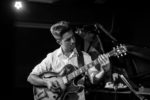
I interviewed the brilliant young jazz guitarist Matteo Prefumo via Skype from his family home in Genoa, Italy, where he splits his time with living in an apartment in New York City. I was amazed at the things I found out about his musical road so far:
DP: So is Genoa your family’s ancestral home?
MP: Yes, I was born here.
DP: and how old are you right now?
MP: I’m 27.
DP: Amazing. So tell about your background – what was the moment where you went “Oooh – I want to be a guitar player?â€
MP: Actually, I decided before I was born (both laughing)
DP: Really? How does a person DO that? (laughing)
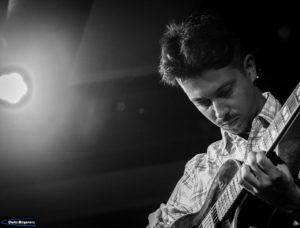
MP: When I was born, the only way to get me to relax and stop crying was to put on a video of Jimi Hendrix, Pat Metheny, or Michael Brecker playing, or Jack Bruce, you know? It was specifically these four cats. I went to my first concert with I was three, and it was John Scofield, Pat Metheny, Steve Swallow and Bill Stewart. I was in the front row in the middle and I didn’t close my eyes, I watched the concert like this (makes enraptured staring face) for three hours! So I started listening to all of these cats and Scofield and Miles and Brecker Brothers especially.
And I’ll tell you a funny story: when I was on my first day in kindergarten, the teacher told the parents to have the child bring something that they really love with them, so I showed up with a guitar like this the first day! (holds up a Fender Telecaster)
DP: No!! How did you carry something like that?
MP: My mom carried it – so the teacher saw that the guitar was bigger than me and she said “OK, Matteo, do you want that I play something on your guitar for you kids?â€, I said “Sureâ€, but I thought she was going to play something by Pat Metheny or Michael Brecker like my Dad did at home for me, and so when she started playing this kids tune, I said “OK, give me my guitar and I will play and you singâ€.
So when I figured out that she couldn’t do any jazz music or Jimi Hendrix or Chick Corea or anything like that, I started singing something like “Better Days Ahead†by Pat Metheny or something like that. So the teacher said “Matteo, what are you singing?†And I said “I am singing Pat Metheny†and she said “Who’s that?â€.
So she thought that I was inventing the name and she said to my parents “We have problem with your kid, he sings strange music and we don’t know the names that he saysâ€. So this was basically the start at this young age – from age 6 or 7 until age 14, I played behind the records without knowing basically anything.
DP: Wait a minute – you could play “Better Days Ahead†at 5 years old?
MP: No, no, I could sing it. I could solo inside the melody without playing the notes on the guitar. There is a video on Facebook I will send you that link https://www.facebook.com/matteo.prefumo/videos/vb.1248726123/10203423065837857/?type=3
So I didn’t know the notes, but I could follow the RHYTHM of melody.
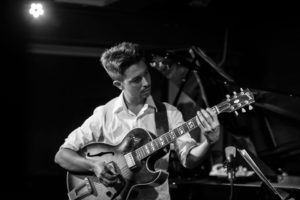
DP: Is your family musical? They must be.
MP: My dad is, he plays guitar not for work, but he’s a great guitar player. So when. I was 14, I started to study with Alessio Menconi. And after that, I started to study on a lot with Kurt Rosenwinkel, Peter Bernstein and Lage Lund.
DP: On line or in person?
MP: On line and in workshops, we are good friends.
DP: How old were you then?
MP: I was like 18. I also am very interested in composition, but I prefer to write on piano and not on guitar.
DP: So how long did you study piano then?
MP: I never studied it, but I transferred what I knew on guitar onto piano. I have perfect pitch also that helped me a lot. So if I hear a note or a tune, I can tell immediately what kind of note or chord it is.
DP: I’ve heard that for a lot of people with perfect pitch, they differentiate different pitches by color, is it like that for you?
MP: No, I didn’t do that, in the beginning, my reference point were the strings on the guitar., like this (strums his Gibson ES-175’s open strings). In my mind I went “how far is that note from the open E?†This was my starting point, this is really helpful for guitar players. My dad discovered that I had perfect pitch when I was like 12, because he tuned the guitar a half tone down and I recognized immediately.
DP: That’s funny that you heard Jimi Hendrix as fitting in with all of those jazz artists, I’ve always heard him like that as well, but most people don’t.
MP: Yeah, if you listen to like “Band of Gypsiesâ€, there’s a lot of jazz I think, If you listen to like “Machine Gunâ€, there is a lot of commonality with the Avant-Garde Jazz. I’m really obsessed with that record, I know EVERY note from “Band of Gypsiesâ€.
DP: So it sounds like you’ve done a lot of transcription in your life?
MP: Yeah, until 14-16, I did Wes (Montgomery), Metheny, Scofield, a little bit of Jim Hall. 
I transcribed a lot of saxophone, piano and trumpet players. Also a lot of Gary Burton, he’s one of my favorite improvisers ever. If you listen to like “Crystal Silence†with Chick Corea, those solos seem like they’re written. They are so perfect and so melodic, I don’t see how it’s possible.
DP: He was one of the first bandleaders to put any elements from rock into jazz at all.
MP: Also, if you see his groups, he always had the guitar, so I think that if you want to be a jazz guitar player, you don’t want to miss those records. Especially how to comp with the vibes…
DP: Exactly, he’s had so many greats – he’s had Julian Lage….
MP: ….Mick Goodrick, John Scofield, Larry Coryell…and I love the compositions, he played stuff by Carla Bley and Keith Jarrett. Keith Jarrett is one of my favorite composers, and I think really underrated as a composer. If you analyze some of the music from his first record “Life Between The Exit Signsâ€, the compositions were so strong, it was an important group.
DP: And you transcribed that stuff and put it on guitar?
MP: Yeah, I played Keith Jarrett stuff on guitar for sure.
DP: So you studied with a private teacher and at some seminars into you were 18, what did you do then – did you go to music school?
MP: No, I studied only privately. Private teachers and the records – musicians that were better than me (laughs). A lot of musicians are scared to share the stage with people that are much better than them, but I think that is the only solution to go UP.
DP: So your composition studies have been completely self taught by looking at other peoples compositions?
MP: Yeah. I’m obsessed by both melody and harmony, but I think that people don’t remember the solos, but they remember the melody. Those musicians whose solos are really melodic, after listening to that tune one time, you can remember everything they play. If you listen to Herbie Hancock, Keith Jarrett, Michael Brecker, Clifford Brown, Freddie Hubbard, Wes Montgomery, Gary Burton – when you listen to one of their solos, you remember everything, they play in a very organic way.
DP: I hear what you’re saying! Hey, I’m seeing some very serious classical guitar nails on your right hand – do you play classical guitar?
MP: Yeah, because I don’t like the sound of the skin. They sound more like a pick. One time when I was like 18 I had to play on TV, and I broke three nails, so I had to get the fake nails, and they sounded actually much better than the real nails. I use them for both acoustic steel string and classical guitar, but I listen to a lot of classical like Debussy and Bartok.
DP: So have you played any of the guitar arrangements of that kind of stuff?
MP: No, but I’ve been thinking to check it out. As teachers I studied mostly with Kurt, Peter, Lage, Kevin Hays etc but one of the people that I’ve learned a lot from was Antonio Sanchez. We’ve become really good friends, I met him at a workshop, He was teaching drums in the morning and I had a guitar workshop in the afternoon, so I was listening at his lesson and talking with him and listening to him teaching has been one of the best learning experiences of my life. He’s an amazing person and an amazing musician, he has a really big idea of music, he has a vision of 360 degrees of the music. The way he follows the melodies and they way that he interacts is incredible, he’s one of my favorite musicians right now.
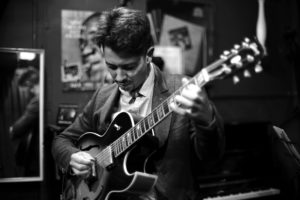
DP: So what have you been doing between age 18 and now at age 27?
MP: I was doing concerts in Italy and then I came to New York City in 2014. At first I went there once a year, and then I moved there last April. It’s a nice place to grow up as a musician, you hang out and see like Brad Mehldau and Ron Carter. I’m looking to do a quartet because I am planning on doing my first record with piano, double bass with electric bass and drums. I want to use the piano because I write everything on the piano and for the harmony it’s really what I need right now. I can’t listen to 90% of my tunes without piano. When I want music for a trio, I write on guitar, when I write on piano, I want it to be on piano.
DP: Who do you like to work with in NYC?
MP: But actually it’s impossible to say who you like to play with, because everyone around is amazing, but if I have to think to people around my age that I really enjoy to play with I would say Francesco Ciniglio (I played with him many times in Italy too, especially in trio), Takeshi Ohbayashi, Felix Peikli, Alex Claffy, Jonathan Barber, Daryl Johns, Taber Gable, Hillel Saleem, Aaron Burnett, Anwar Marshall, Sergej Avanesov, Carlos Homs, Kelly Green and many many many many many many many many others, they are amazing musicians and really great persons and have a great vision of the music!
I like people who have a really strong melodic sense who can work off a solo really organically and comp in a great way.
Melody is always my first priority on the drummer. If you listen to those guys like Tony Williams, Antonio Sanchez, Jack DeJohnette, Paul Motian – they are so melodic.
A lot of times if you say to people that you like melodic drummers they look at you like “What do you mean?†but for me, drummers are really the most important guy in the band, because he can DECIDE everything.
He can affect the way a melody sounds how your solos sounds and really can change a lot, basically the drummer is the leader of every group so basically if I have to create a new project I always start from the drummer.
DP: So are you going to self-produce this record or do you have a label?
MP: It’s the first record and I really want to do it the right way, I don’t want to do something that everyone forgets about after the first year.
I think it will be self-produce but if a label will ring at the door and it will be interested into producing it, why not?
I’m thinking of getting an arranger to help me as well, I am thinking about records by like Weather Report, Miles Davis, there was always collaborations, Wayne (Shorter) with Joe (Zawinul), Pat Metheny with Lyle Mays, Michael Brecker/Gil Goldstein you know what I mean?
Behind my favorite records there were always two minds, basically. 
I want to ask another person who is really interesting who can put in something that I can’t put in.
DP: I saw pictures at your website of you with Chick Corea, Pat Metheny, George Benson…
MP: I’ll tell you a funny story: when I was 17 I wrote a jazz waltz that was really happy like the music of Chick Corea but I never had the chance to meet him, so when he was playing gin New York City I printed off the tune and I gave it to him after seeing him two nights with Steve Gadd, and I didn’t say anything but last Christmas Day I received an email from him saying that he really enjoyed the tunes.
DP: So now today you are in Italy and I assume that you’re writing and getting ready to go back to New York?
MP: Yes, I’m working on finishing a lot of tune because a lot are unfinished, but I’ve already written like 40 tunes. And I’m also thinking about a side project that I want to put out with some other guys. I hope to go into the studio in New York before the end of this year. It will be a lot of young players, people around my age.
DP: You told us who your original influences were, who are you listening to right now?
MP: Right now I’m listening to a lot of Chick Corea, Michael Brecker, Hendrix…Robert Glasper, especially his record “Canvasâ€, I really like him. Herbie, Keith Jarrett, Freddie Hubbard, and Hiatus Kaiyote and a group called “Moonchildâ€, they are from LA I think.
DP: So, obviously there are a lot of things that would have been a challenge for most people that weren’t a challenge for you: you have perfect pitch, and you learned to play from a really young age. What are the challenges that you are facing right now?
MP: I love guitar, but guitar is like tool for me. My goal is to write great music and play it in the best way possible. Composition is always my main goal, when I write a tune, I want people to remember it after they first hear it. 
If you listen to all the greats like Herbie and Miles, Wayne, Steve Swallow – even when they write difficult music, you can sing it.
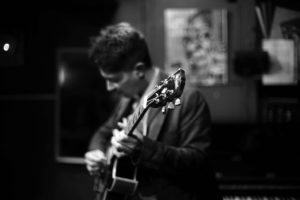
DP: Tell me about your gear and your sound.
MP: Right now I’m playing a Gibson ES-175 and an American Telecaster. I try to always use the latest technology, so right now I am playing through a Fender Twin Reverb, but I’m thinking of moving to the Kemper or the Fractal, because you have greater possibilities to create new sounds. Also, I just bought a new Lexicon PCM70 – generally, I prefer the rack stuff. I also use an Audio Technica AT831 microphone inside my Gibson to blend the acoustic sound of my guitar in as well. And I always try to play a stereo set-up. I always use four signals: left and right is two, the microphone is the third, and the DI is the fourth.
I use the DI to get the attack of the guitar, so basically it’s a clean signal plus a bit of reverb on the aux. The DI and the mic go to the house system, and the left and right of the PCM70 go to two Twins. I also really like the Henriksen https://www.henriksenamplifiers.com/product/jazzamp-112/ and the Magnatone amps (https://magnatoneusa.com/ ) they and the Fender Twin are my favorite amps.
I’m also thinking about getting a custom guitar made, I played a Moffa, an Italian guitar maker, he made few for Kurt Rosenwinkel, it sounds amazing.
I played it at a concert I did at Ronnie Scott’s in London on last October (in trio with Marco Panascia and Enzo Zirilli) and it was a life changing moment for me.
It has a really big sustain, one of the best guitars I’ve ever played in my life. (their site is down, this is all that I find – they might be out of business: https://www.crguitars.com/site/itemsList/category/Moffa-Guitars )
In terms of acoustic guitar, I really enjoy the PRS acoustic, but the other acoustic guitar that I love that (I tried it few years ago when she was in Italy) is the Linda Manzer guitar. I also have two Ovations, I love that one too.
I also want to experiment with different effects, I want to use different sounds for different songs. When I compose, I have about a 3TB software instrument library that I use including Kontakt and Trillian, and I work with Cubase 8.
I always write with the computer – not that I just use the computer, but with the computer I write ideas that I couldn’t write without it.
You can change the order of everything…if there is technology, why wouldn’t you use it?
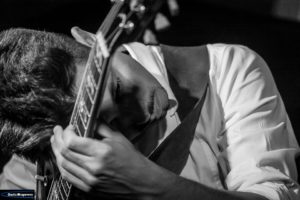
DP: I completely agree! So in closing. you have any advice for other players?
MP: Well. a lot of people try to compare themselves to others, and I really think that it’s the best solution to compare yourself to your heroes.
So it you see someone who is better than you, play with him.
I know that sometimes people are afraid to do that, but it’s the only solution to really become better.
DP: So you’re stretching farther because you’re reaching higher, I get it.
Matteo Prefumo is definitely an up and coming jazz guitarist to watch, for more, go to:
http://www.matteoprefumo.com
Facebook Page: https://www.facebook.com/OfficialMatteoPrefumo/
Instagram: https://www.instagram.com/matteoprefumo/